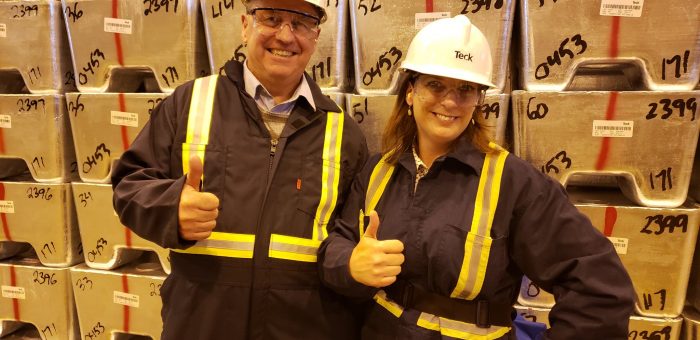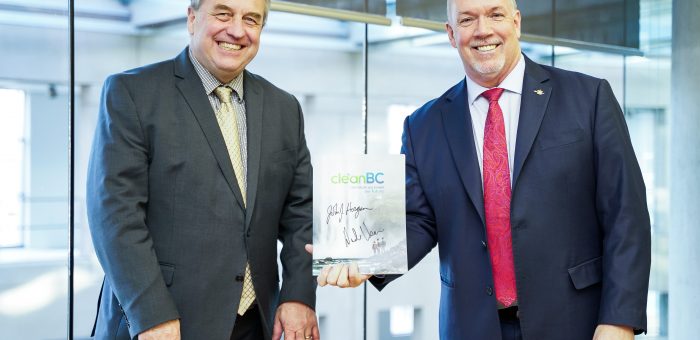Issues & Community Blog - Andrew Weaver: A Climate for Hope - Page 20
From the sublime to the ridiculous: BC Liberals in a tizzy on the last day of the legislature
It’s been a week since the legislature rose for the summer and it’s taken me that entire time to muster up the energy to write about the BC Liberal antics on the last day of the session.
Those who have been following the daily proceedings of the BC Legislature will know that on Wednesday May 29, 2019 the Speaker decided it would be prudent to back up several computers in the legislature and store the data off site. While the BC Liberals spun themselves into a tizzy over what can only be described as normal and due process in light of the ongoing Auditor General and police investigations into the conduct of several senior legislative employees, their overall behaviour has left me dumbfounded.
The backups occurred after work to allow the employees to continue using their computers during the day while the legislature was sitting. Stories have emerged about how the Leader of the Official Opposition was hiding around corners and popping out to photograph the Speaker’s Chief of Staff as he walked around the building. When asked why the computers needed to be backed up, the Speaker’s Chief of Staff told the Vancouver Sun:
“[The Speaker] simply wanted to ensure that all records were properly stored. He said he recalled five instances in the past where information, documentation and evidence ‘vanished into thin air.'”
A Liberal staffer also slept in their office during the evening of May 29 to prevent anyone from entering out of apparent fear of some sort of ongoing Legislative Inquisition. And on Thursday morning, chaos ensued as the BC Liberals initiated an all out assault on the integrity of the Speaker. Those who read what follows will probably have the same questions that I have. What on earth are the BC Liberals afraid of?
Thursday morning started the same as it always does. Visitors to the gallery were introduced and then we moved to Members’ Statements. Each day the legislature sits, three government and three opposition MLAs give two minute statements in which they typically celebrate something or someone in their riding. On Thursday morning, the Leader of the Official rose and delivered a bizarre rebuke of the Speaker’s apparent actions. Ironically, he concluded his statement with these words:
“We must work to make this a better place to conduct the business of the people of British Columbia as the elected representatives of the people of British Columbia. Part of that involves the continuity of the democratic process. So question period must proceed. That is part of the democratic process. This House must sit, but this House must also sit until the air is cleared about the events of the last 24 hours.“
And then the Liberals proceeded to boycott the rest of their Members’ Statements. As such, a number of government MLAs and I scrambled to offer impromptu statements to fill the void that had been created. Mine was on the topic of global warming and intergenerational equity.
During the lunch break from 12:00 to 13:30 the BC Liberals continued their attack on the Speaker. First, the Leader of the Official Opposition offered up one of their own members to serve as a new Speaker if the BC NDP and BC Green caucuses would agree (we did not). Then, their house leader decided to hold a press conference wherein she released handwritten notes she had made at a House Leaders’ meeting with the Speaker the day before.
What’s remarkable about the release of the notes is that the day before, the three house leaders agreed that the BC Liberal house leader would be the note taker. But those same notes were never circulated among the house leaders for approval before they were publicly released. Our house leader, Sonia Furstenau, was incensed and immediately distanced herself from them in a hastily put together press conference we organized immediately after the lunch break on May 30.
But it didn’t end there.
The afternoon sitting was to continue with the debates on Budget Estimates for the Office of the Premier. Recall that I had risen on May 29 for 20 minutes to ask the Premier a series of questions concerning demand side measures that affect the price of gasoline. Initially I had requested a full hour of time as I had a suite of other questions that I had hoped to raise on a variety of other topics. In discussion with the BC Liberals (who we schedule time with) they were very adamant that I only be given 20 minutes as they had so many questions that they wanted to ask. There are battles that you pick in the legislature and this was not one of the ones I wanted to waste my energy on. As such, I agreed to rise for only 20 minutes on the Wednesday.
So you can imagine my surprise when I walked into the chamber after Sonia and I held our hastily put together press conference on Thursday to witness Ravi Khalon, the BC NDP MLA for Delta North, asking the Premier a series of questions. I subsequently learned that the BC Liberals had decided to boycott the rest of Premier’s estimates (and shut down debates in the other committee rooms too), presumably to try and force the house to adjourn before the Lieutenant Governor arrived later in the day to give Royal Assent to a number of bills. As such, the NDP and BC Green MLAs had to spontaneously fill the remaining time with questions to the Premier.
I took the opportunity to express my frustration with the behaviour of the BC Liberals (see jesting exchange video and text reproduced below). Seeing as I didn’t have any background research with me, I could not ask the more detailed questions I had originally planned to. Instead, and to kill a bit of time to allow the NDP MLAs to put together a speaking list, I followed up with two sports questions and one more serious open-ended question. In the latter, I asked the Premier if he could reflect upon the last two years and perhaps identify some of the high points that he believes are important areas where the government and the B.C. Green caucus have worked together for the betterment of the people in British Columbia (see text and video of Premier’s reflection below). I thought this question was particularly timely as it was the two year anniversary of the date that he and I signed the Confidence and Supply Agreement underpinning his minority government.
As the time approached when we were expecting the Lieutenant Governor to arrive in the precinct, the next stage of the BC Liberal antics got underway. After the passage of third reading of a couple of bills (that the BC Liberals did not support), BC Liberal MLA after BC Liberal MLA rose on a point of personal privilege. For the better part of an hour, virtually ever single BC Liberal MLA, including the Assistant Deputy Speaker (BC Liberal MLA for Coquitlam-Burke Mountain Joan Isaacs) read out a statement along the lines of:
“I rise pursuant to Standing Order 26 on a matter of personal privilege. I have become aware of behavior and conduct undertaken by the Speaker with respect to senior officers and employees of this Legislative Assembly that I believe to be improper and compromises the ability of those officers to independently perform their duties.
I have further become aware of activities undertaken by the Speaker, including the seizure of records, including electronic records, that I believe constitute improper conduct with respect to my rights as a member of this assembly and impede my personal freedoms as a member of this assembly.
Insofar as the Speaker serves as the presiding officer of this assembly, I wish to disassociate myself for all purposes, including any subsequent litigation from these actions, which I believe constitute a breach of the individual and collective privileges of this House and contempt for this House.“
While they proceeded to filibuster the closing of the session, the Lieutenant Governor was kept waiting.
At 18:05 the Lieutenant Governor finally arrived to a house void of virtually every BC Liberal MLA. All but three had decided to leave and boycott Royal Assent.
This was perhaps the most disgraceful and disrespectful behaviour I have witnessed in my six years in the legislature. Each and every MLA swears allegiance to the Crown and the Lieutenant Governor is Her Majesty’s representative in British Columbia. As the Lieutenant Governor walked in, it was obvious that she was visibly surprised by the absence of the BC Liberal MLAs. It was also obvious that the BC NDP and BC Green MLAs were visibly uncomfortable with what was going on. The Lieutenant Governor put on a brave face, gave Royal Assent to several bills (including one of my private members’ bills) and quickly left the building without the customary hand shakes and exchange of pleasantries with MLAs.
Looking back on this last day, it is clear to me that two things need to happen.
1) The BC Liberals, and in particular their Leader, need to offer a formal apology to the Lieutenant Governor for their disrespectful behaviour. There is simply no excuse for what transpired on the last day of the house. I honestly don’t know how Mr. Wilkinson sees himself as Leader of “Her Majesty’s Loyal Opposition“. There was nothing ‘Loyal’ about his party’s behaviour last Thursday.
2) Joan Isaacs needs to immediately resign as Assistant Deputy Speaker. Failing that, I will almost certainly bring in a motion to have her replaced in the fall. It is unconscionable that she would undermine the non partisan nature of the Speaker’s office by reading out the above statement while wearing her Assistant Deputy Speaker gowns in the chamber. This is now the second time that she broken longstanding tradition and worn a partisan hat in her non partisan role.
It’s unfortunate that the BC Liberals continue to behave the way they have been in the legislature. The province deserves an effective opposition that respects, not flouts, the integrity of our institution. Their response to the Speaker’s desire to protect data for ongoing investigations was over the top and positively bizarre. It leaves me wondering why?
Videos of Exchange
| Jesting exchange | Premier’s Reflection |
Text of Jesting Exchange
A. Weaver: My humble apologies to the member for Powell River–Sunshine Coast. There are some burning questions I have for the Premier, in light of the fact that I had requested an hour’s time of the Premier’s estimates. I was told by members opposite that I could only have half an hour, because they had too many questions to ask.
Now I see that they decide not to ask questions. Yet another example of us listening to them….
Interjections.
The Chair: Members, come to order.
A. Weaver: Not having them agree to one thing and not following through.
Interjections.
The Chair: Members.
A. Weaver: As the Leader of the Third Party, it is my right to ask questions. I respected the jurisdiction of the official opposition to have more time, because they had so many burning, urgent questions that they felt it was appropriate for me to rise at 6:30 for 20 minutes last night when I knew I had an hour.
I have three very important questions for the Premier. I’m sure all British Columbians want to know. To the Premier, who do you want to win the basketball game tonight?
Hon. J. Horgan: I’ve become accustomed to questions not necessarily related to the office budget of the Premier, so I’m happy to answer this question as well. It speaks to something that all Canadians are passionate about. I myself, was a university basketball player. I’m a big fan of hoops. I’m a huge fan of the Vancouver Grizzlies. Before that, the Seattle SuperSonics. They’re both gone now. Go, Raptors, go!.
A. Weaver: On this important line of question, I have, for most of my life participated in hockey pools. In fact, I won a hockey pool one. I won $10,000 once. It was quite remarkable. I was very pleased.
However, this year I had chosen Boston against St. Louis in the final, but I got knocked out in the first round. My question to the Premier is: who does he want to win the Stanley Cup this year?
Hon. J. Horgan: If I had consulted with community liaison member Blair Lekstrom who is very ably helping us with caribou issues in the Peace country, he would have said the Boston Bruins. He had the audacity to wear a Boston Bruins jersey into our meeting earlier this week.
I certainly couldn’t support that initiative because of the 2011 outcome in Vancouver, but I think St. Louis is long overdue. It seems an ideal place to send the Stanley Cup.
Text of Premier’s Reflection
A. Weaver: On a more serious note, I just would like to ask an honest question here. As the Premier will know, we’ve been together under the CASA agreement for the last two years. There have been low points and there have been high points. I’m wondering if he could reflect upon the last two years and perhaps identify to the Legislature some of the high points that he believes are important areas where the government and this B.C. Green caucus have worked together for the betterment of the people in British Columbia. Perhaps he could elucidate that for the members of the gallery there who would like to learn about some of the good work that has been done.
I can understand it will take the Premier some time to reflect upon this, because there is so much good work that has been done. I really believe the Premier might need a few minutes to reflect upon the good work that’s been done.
Hon. J. Horgan: I thank the member, my colleague in the CASA agreement, for his question. It has been two years plus a day since we signed the agreement, a historic agreement in British Columbia, that’s led to stable government, positive outcomes for British Columbians in every corner of the province.
It’s difficult to point to one highlight, but one I know that the member will be most satisfied with is the development of CleanBC, which was absolutely integral to the foundation of a climate action plan that leads the continent. He and the Green caucus were critical to making that happen. I know members on the other side of the House as well, leading the first carbon price in North America set by the former government…. Their enthusiasm has waned over time for that, but I know that they laid a solid foundation. I give full credit to Premier Gordon Campbell for having the courage to start that initiative. I’m excited that we’re here to take the next step and lead the country and, in fact, the continent in that regard.
When I think about…. Again, the member comes from the post-secondary sector, so he would also agree with me that eliminating fees for English language learning and adult basic education was also critical to reducing barriers, eliminating obstacles to people realizing their full potential. At a time when we have a skills shortage, it’s important that we get people back into the classroom so that they can get the skills they need to be full participants in the economy, for their families, for their communities and, in fact, for the province.
We also have done a number of initiatives to cap tuition fees, to ensure that we have eliminated interest on student debt, on B.C. student debt, which I think is something that would be applauded by all members of this House. One area that I’m particularly excited about, the member for Mount Pleasant, the member for Kootenay West and I were at Vancouver Island University in the first couple of weeks of our time in government — at Vancouver Island University in Nanaimo — announcing the tuition waiver for kids in care.
Of course, for those who are unaware of the program, that is an opportunity for those who have been in foster homes, have been wards of the state. When they age out, oftentimes they see an abyss rather than an opportunity. By waiving tuition fees, we’ve allowed kids in care to see hope in their future, to see opportunity in their future. That’s not just good for the individual. It’s good for the broader community. I know our colleagues in CASA were very supportive of that.
Arts and culture is another area that I’m very proud of. Reinvesting in the B.C. Arts Council, making sure that we’re doing everything we can to get the payback that we all see from arts and culture.
I’ve been to a number of film studios, in my time as Premier to see firsthand just the enormous number of jobs that we get in this sector. I know my deputy and I are ad idem on this question. We see electricians, carpenters. actors, extras — extras that get their big break by being at the right place at the right time on a Netflix film or a series or whatever it might be. That launches their careers.
Deadpool coming to B.C., not once, but twice and, let’s hope, three times. Probably the defining moment for me was just last week, Member, when I was visiting a studio in Vancouver that did the dragons for Game of Thrones. Now, not a lot of people know that. But the CGI for Game of Thrones was developed and designed in Vancouver, which had a whole host of other spinoffs for the community. Subcontractors creating more jobs, good high-paying jobs, whether it’s coders, whether it be artists, and that’s all happening here in British Columbia — not just in Vancouver, by the way, but also throughout B.C.
On the economy, of course, the member will know that we put in place an innovation commissioner to make sure that we’re talking about the economy of the future. We also, of course, are very mindful that traditional industries built British Columbia. We’re working hard to make sure that forestry, mining and other resource industries can prosper and flourish. Agriculture is very important to the member. He supports the agricultural land reserve. He supports strengthening tools like that for all British Columbians.
I know the member would like me to go on.
Interjection.
Hon. J. Horgan: You would? Okay. Creating a ministry…. I didn’t know I was filibustering myself, but here I find myself. It’s been a while. Excuse me.
On the housing side, the member is devastated, as I am, to see homelessness proliferating across B.C. But with modular housing programs, we’ve seen the hard-to-house and homeless finding a place to hang their hat and to start a new life, and it’s been transformative in places like Surrey. The Whalley strip was infamous, and now that’s been changed. Nanaimo. We’re working very hard on that. One of the largest tent cities in Vancouver Island’s history. No longer there. Service is in place for the people that have been moved into modular housing.
We’ve increased a whole host of other issues with respect to seniors. We’re demanding accountability for staffing standards in care centres. There’s more support for Shelter Aid For Elderly Renters, increased length of home support visits, capital funding to strengthen senior centres.
A systematic review of care centre staffing levels. This is something that the Minister of Health was absolutely pivotal on. We remember back to the turn of the century, when the government of the day was ripping up contracts, making it more difficult for seniors to find care facilities that were appropriately staffed with enthusiastic workers — caregivers that were not just coming to a job, but coming to care for our moms, our dads and our loved ones. An underrespected and underpaid area of our economy, and we’ve taken steps through the leadership of the Minister of Health to achieve that, with the support of the Green caucus.
We ended the disability clawback for transportation for bus passes. I know the member responsible for poverty reduction was the lead on that, but we had full support of the Green caucus in that regard. And a whole bunch of other stuff.
Anti-SLAPP legislation. I know the member and I talked about anti-SLAPP legislation in the first session. There were some challenges. A decision, a determination made in Ontario, made the bill that we were working on together on this side of the House a bit in doubt. We worked with the Attorney General, leg. counsel and the Green caucus to make sure that we could have anti-SLAPP legislation here British Columbia to protect those who are standing up for their communities.
We’ve made a whole host of other changes. The reduction of PST on electricity was absolutely critical to industry and something that should have happened a long, long time ago. That’s created more opportunities as well. I think there’s more here, but I think if the member has more questions, I’ll take that….
Presenting at the Clean Energy BC Spring Conference: Powering Generations — Legacy to the Future
Today I had the distinct honour of giving a keynote presentation at the 2019 Spring Conference of Clean Energy BC whose theme was Powering Generations: Legacy to the Future. After the presentation we toured the Teck smelter in Trail to explore innovation in the mining sector first hand.
Below I reproduce the text and slides of my speech.
Text and Slides of Speech
It’s a distinct honour for me to be invited to address you, the delegates to Clean Energy BC’s Spring Conference: Powering Generations: Legacy to the future.
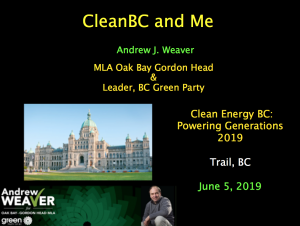 Over these past 25 years Clean Energy B.C. has been the voice of British Columbia’s Clean Energy sector and I am sincerely grateful for your ongoing contributions to our province.
Over these past 25 years Clean Energy B.C. has been the voice of British Columbia’s Clean Energy sector and I am sincerely grateful for your ongoing contributions to our province.
The BC Green Party and I share your goal to support the growth of British Columbia’s clean energy sector and we will continue to do what we can to improve the regulatory and economic environments for clean energy production through our work in the B.C. legislature.
Since first getting elected in 2013, I’ve watched growing uncertainty emerge in British Columbia’s clean energy sector. I’ve watched the Canadian Wind Energy Association pull out of BC. I’ve watched BC Hydro’s standing offer program grind to a halt.
I’ve witnessed the release of a poorly researched report to justify government’s ideological position on independent power producers. And I’ve watched a growing sense of overall frustration emerge as your sector struggles to remain viable.
Of course, as we all know, government’s decision to proceed with the construction of the Site C hydroelectric project was both unnecessary and fiscally-foolish.
It has undermined the investments many of you made in clean energy here in BC. And it puts the ratepayer on the hook for inevitable cost overruns down the road.
But we are where we are and for me, it’s important to look ahead.
I entered politics via an unusual route. By now, most of you know that prior to my election as the MLA for Oak Bay – Gordon Head (and subsequently becoming leader of the B.C. Green Party), I was Lansdowne Professor and Canada Research Chair in Climate Modelling and analysis at the University of Victoria.
I’d served as a Lead Author on the United Nations Intergovernmental Panel on Climate Change 2nd, 3rd, 4th and 5th scientific assessments. I was Chief Editor of the Journal of Climate and I had the honour of participating as a member of BC’s first Climate Action Team set up in 2007 under Gordon Campbell’s leadership.
The year 2007 was a remarkable period in British Columbia’s history with respect to the development of climate policy. It was also a particularly noteworthy time for me.
I’d been publishing papers in the field of climate science for more than two decades, all the while listening to political leaders around the world talk about the importance of dealing with global warming while concomitantly doing virtually nothing to reduce greenhouse gas emissions and offering staggering subsidies to the fossil fuel sector.
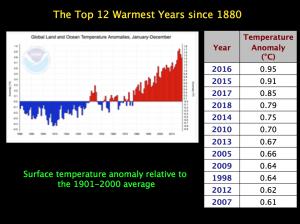 But in 2007 in British Columbia I finally saw a government take the matter seriously and recognize the challenge of global warming for what it was: an economic opportunity for innovation like never before. Gordon Campbell recognized that early leadership would pay off and that all eyes in the world would be turned to BC in 2010 when we hosted the Winter Olympics.
But in 2007 in British Columbia I finally saw a government take the matter seriously and recognize the challenge of global warming for what it was: an economic opportunity for innovation like never before. Gordon Campbell recognized that early leadership would pay off and that all eyes in the world would be turned to BC in 2010 when we hosted the Winter Olympics.
On November 20, 2007 the Honourable Barry Penner, Minister of Environment, introduced the Greenhouse Gas Reduction Targets Act, which put into law British Columbia’s 2020 reduction target of 33% and a new 2050 reduction target of 80% relative to 2007 levels.
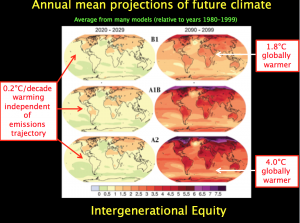 The act also required carbon neutrality for the public sector, including universities, schools, hospitals, Crown corporations, and the government by 2010. And over the next several years as government rolled out its policy measures, BC head off on a path to meet its legislated targets.
The act also required carbon neutrality for the public sector, including universities, schools, hospitals, Crown corporations, and the government by 2010. And over the next several years as government rolled out its policy measures, BC head off on a path to meet its legislated targets.
But all of our successes started to unravel shortly after British Columbia’s provincial leadership changed in 2010. In fact, every year since the 2011 change of leadership, emissions have gone up.
Why? Because of the signal government sent to the market that our emissions reductions targets no longer mattered — that economic prosperity would be found in industries from the last century, and that they would help take us back there.
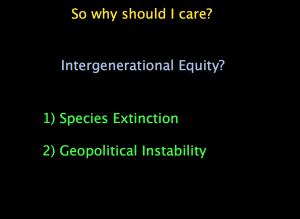 It happened almost immediately after the leadership of the BC Liberals changed. In fact, I remember participating with Judith Sayers, Paul Kariya and Graham Horn (from Innergex) at a press conference hosted by Clean Energy BC in September 2011 where we pleaded with government to stick with its plan to become self-sufficient in clean energy.
It happened almost immediately after the leadership of the BC Liberals changed. In fact, I remember participating with Judith Sayers, Paul Kariya and Graham Horn (from Innergex) at a press conference hosted by Clean Energy BC in September 2011 where we pleaded with government to stick with its plan to become self-sufficient in clean energy.
In 2012, knowing that scientists had done their job in defining the problem and that it was up to politicians to do theirs if we are to deal with the challenge of global warming — and they are not — I accepted an invitation to run as a candidate representing the BC Green party. I could no longer sit on the sidelines as the legacy of Mr. Campbell’s climate leadership was dismantled.
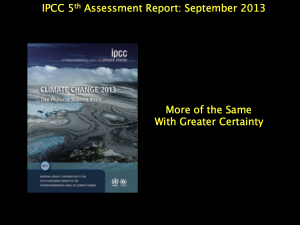 The BC Liberals under Christy Clark had stifled clean innovation and introduced policies that further entrenched “dig-it and ship-it” oil and gas development.
The BC Liberals under Christy Clark had stifled clean innovation and introduced policies that further entrenched “dig-it and ship-it” oil and gas development.
And were the BC Greens not holding the balance of power in a minor government, I fear that the BC NDP would be no different (as witnessed by the outrageous giveaway involved in their proposed further subsidies to the LNG industry).
When the market no longer supported these activities, successive governments doubled done by creating more and more subsidies in a desperate attempt to squeeze water from a stone.
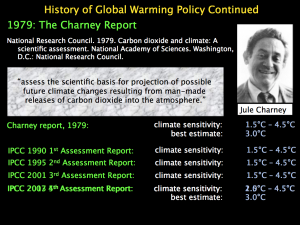 I often reflect back on the spring of 2017 when my colleagues and I were locked in negotiations with both the BC NDP and the BC Liberals as we hashed out the foundations of a confidence and supply deal. I reflect back to remind me of why I got into politics and why we ended up supporting a BC NDP minority government.
I often reflect back on the spring of 2017 when my colleagues and I were locked in negotiations with both the BC NDP and the BC Liberals as we hashed out the foundations of a confidence and supply deal. I reflect back to remind me of why I got into politics and why we ended up supporting a BC NDP minority government.
Climate scientists had done their job in defining the problem and that it was up to politicians to do theirs if we are to deal with the challenge of global warming. Only the BC NDP appeared serious in its desire to reduce our greenhouse gas emissions.
And so the seeds were planted for what would end up becoming CleanBC.
CASA – our confidence and supply agreement – underpins B.C.’s minority government. It is an agreement to work in good faith, with no surprises, with the B.C. NDP.
 CASA has provided the B.C. Green caucus with an opportunity to champion key aspects of our economic platform, and the ability to work in partnership with government on our priority issues like climate policy.
CASA has provided the B.C. Green caucus with an opportunity to champion key aspects of our economic platform, and the ability to work in partnership with government on our priority issues like climate policy.
From our perspective, of course, these two files are one and the same.
Two key elements of our 21st century economy platform were embedded in the CASA agreement to help us identify and hence seize economic opportunities in the emerging economy.
The first was the Emerging Economy Task Force set up to advise government on how to respond and adapt to emerging economic challenges and opportunities. Government needs modernizing so that it is considerably more responsive to technological innovation.
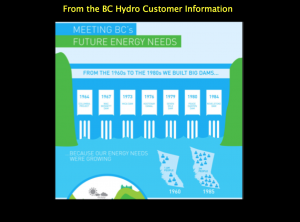 The Emerging Economy Task Force looks to the future, identifying emerging trends and advising government on how to maintain our competitiveness and achieve prosperity amidst these changes.
The Emerging Economy Task Force looks to the future, identifying emerging trends and advising government on how to maintain our competitiveness and achieve prosperity amidst these changes.
The second element from our platform integrated into CASA was the Innovation Commission (now Innovate B.C.) as well as the appointment of an Innovation Commissioner.
The innovation commissioner serves as an advocate and ambassador for the B.C. technology sector in Ottawa and abroad, to enable B.C. companies to more easily tap into existing federal programs and build key strategic relationships internationally.
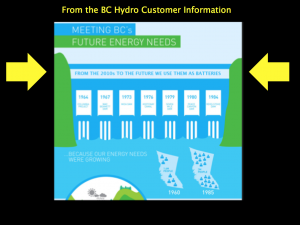 I’m confident that both of these initiatives will continue to bolster and grow key sectors of our economy.
I’m confident that both of these initiatives will continue to bolster and grow key sectors of our economy.
But of course, the most important words in CASA from my perspective are:
“Implement a climate action strategy to meet our targets”
which is why we pushed government to legislate these in the spring of last year:
GHG emissions are to be reduced by at least 40 per cent below 2007 levels by 2030, 60 per cent by 2040, and 80 per cent by 2050.
Targets without a plan to meet them are not worth the paper they are written on. Canadian political history is littered with a legacy of missed targets. And that’s why we turned our attention to delivering a pathway to reach these targets.
A meaningful climate plan requires careful planning, innovative ideas, and a new economic vision for how B.C. will prosper in a changing and challenging world.
If we are to meet our legislated targets — we will be doing so with clean energy — likely following the lead of people in this room.
In that regard, B.C. is setup to succeed. From our access to cheap, renewable energy, to our educated workforce, to our innovative business community, to the quality of life we can offer here, together with British Columbia’s natural beauty, we have an opportunity to develop our Province into one of the most prosperous jurisdictions in the world.
 Our challenges are too big, and the consequences too profound, to ignore this opportunity.
Our challenges are too big, and the consequences too profound, to ignore this opportunity.
We stand to gain by building on the expertise that our neighbours have already developed in these areas. And yet, there is still so much room to grow in this sector, to improve upon current technologies and policy innovations.
The approval Site C was a terribly disappointing decision for me because I believe small-scale, distributed energy projects are the way of the future for B.C. and that we should fundamentally change the mandate of B.C. Hydro.
B.C. Hydro should no longer be the builder of new power capacity.
Rather, it should be the broker of power deals, transmitter of electricity, and leveller of power load through improving British Columbia power storage capacity.
Let industry risk their capital, not taxpayer capital, and let the market respond to demands for cheap power.
We need to optimize support for clean energy development, including grid storage for community or privately generated power and work with neighbouring jurisdictions to expedite the phase out of fossil fuel powered electricity generation.
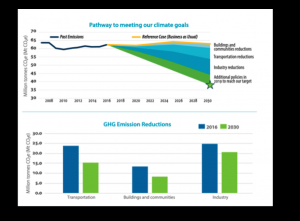 The future of economic prosperity in B.C. lies in harnessing our innate potential for innovation and bringing new, more efficient technologies to bear in the resource sector.
The future of economic prosperity in B.C. lies in harnessing our innate potential for innovation and bringing new, more efficient technologies to bear in the resource sector.
B.C. will never compete in digging dirt out of the ground with jurisdictions that don’t internalize the same social and environmental externalities that we value.
We will excel through being smarter, more efficient, cleaner and by working together to solve our problems.
This means that we not only export the dirt, but we also export the knowledge, technology and value added products associated with resource extraction.
To get a fair value for our resources that deliver maximum benefits to our communities, we need to get smarter and more strategic when it comes to embracing innovation.
Government should be doing more to support these initiatives and create fertile ground for a sustainable, resilient, and diverse economy.
We should be using our boundless renewable energy resources to attract industry, including the manufacturing sector, that wants to brand itself as sustainable over its entire business cycle, just like Washington and Oregon have done.
We should be setting up seed funding mechanisms to allow the B.C.-based creative economy sector to leverage venture capital from other jurisdictions to our province.
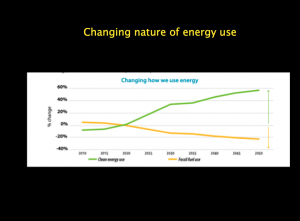 By steadily increasing emissions pricing, we can send a signal to the market that incentivizes innovation and the transition to a low carbon economy.
By steadily increasing emissions pricing, we can send a signal to the market that incentivizes innovation and the transition to a low carbon economy.
The funding could be transferred to municipalities across the province so that they might have the resources to deal with their aging infrastructure and growing transportation barriers.
Yes, we should be investing in trade skills, as described, for example, under a B.C. jobs plan.
But we should also be investing further in education for 21st century industries like biotech, high tech and cleantech. It’s critical that we bring the typically urban-based tech and rural-based resource sectors together.
Similarly natural gas has an important role to play, but we should use it to use in our domestic market and explore options around using it to power local transport.
Global investment trends are being driven by the world’s shared Paris commitments, predicated on the fact that keeping global warming under 2 degrees Celsius is far more cost-effective than dealing with the effects of a temperature rise above that level.
This shift presents a significant opportunity for B.C.’s economy.
Our province is well poised to bolster its leadership in the cleantech sector – we have a strong competitive advantage in the building blocks required to foster a knowledge-based economy.
For we know responding to the challenge of climate change is both an intergenerational opportunity and an intergenerational responsibility.
CleanBC’s sectoral approach doesn’t simply show a plausible pathway to meeting our targets – rather, it drives a return to the vision of a clean 21st century economy.
We have one of the best public services in the world and for a long time they have had the policies ready to get us there.
 What has been missing is political leadership. This minority government must – and will – show that leadership.
What has been missing is political leadership. This minority government must – and will – show that leadership.
I’m hopeful, but still wary of our starting point and the strength of the status quo.
Yet I am truly excited about the prospects that lie ahead for this minority government. We’ve accomplished a remarkable amount already in just two short years.
But there is so much more to do. The years ahead will require all of us to come together to look for areas where we can be partners – to drive the innovation that will enable us to electrify our economy and decarbonize our energy systems. I don’t doubt that many of the emerging solutions we need will in fact come from the people in this room.
The transition to a low carbon economy presents an exciting challenge for the Clean Energy sector. For example, one of the flagship proposals within CleanBC is the aggressive Zero Emission Vehicle which came into law with the passage last week of the Zero Emission Vehicle Act.
 This act mandate that zero-emitting vehicle must make up 10% of light-duty vehicle sales by 2025, 30% by 2030, and 100% by 2040. The good news is that in the month of May alone, 15% of all new light-duty vehicle sales were zero-emitting.
This act mandate that zero-emitting vehicle must make up 10% of light-duty vehicle sales by 2025, 30% by 2030, and 100% by 2040. The good news is that in the month of May alone, 15% of all new light-duty vehicle sales were zero-emitting.
With the electrification of the transportation sector and our built environment comes the opportunity for innovation in smart grid systems.
Whether it be interconnecting myriad distributed production, with innovative local storage systems and point to point high voltage DC transmission, or whether it be the design of new electric transportation systems, or whether it be electrification of our natural resource sector, Clean Energy BC has a strong and vibrant future in our province.
And I remain committed to your sector and I ask that you help me help you. I don’t know what I don’t know. I don’t have all the solutions… but, I know that it is not this:
Responding to the Premier’s Statement on the 75th anniversary of D-Day
June 6th, 2019 marks the 75th anniversary of D-Day and the battle for Normandy. The Premier rose yesterday (the last day the Legislature sat before the anniversary) to deliver a Ministerial Statement to commemorate this historic event. I responded to this Ministerial statement and reproduce the video and text of this response below.
Video of my Statement
Text of my Statement
A. Weaver: I rise to echo the compelling words of the Premier. His passion and heartfelt words were very inspiring.
As we know, on June 6 it will be the 75th anniversary of D-Day and the Battle of Normandy. D-Day was one of the most well-known and important events of the Second World War, and Canadians played a critical role in this pivotal campaign. It changed the direction of the war, but it came at a terrible cost.
On June 6, 1944, the Allies launched a massive attack, with 7,000 vessels being used, 4,000 bombers and 3,700 fighter planes. More than 450 members of the 1st Canadian Parachute Battalion were amongst the very first to engage the enemy forces. A few hours later, 14,000 Canadian troops from the 3rd Canadian Infantry Division and the 2nd Canadian Armoured Brigade would land on Juno Beach, braving heavy fire for the Canadian soldiers, who were successful in capturing their shoreline positions and who endured some of the worst fighting over the next several days of the Normandy invasion.
Canadians suffered the highest casualties of any divisions in the British Army Group during the campaign, and 359 Canadians died on D-Day itself. More than 5,000 would die in the ten weeks of fighting that followed. More than 13,000 Canadian soldiers were severely wounded during this time. Mental and physical injuries that many would carry for the rest of their lives also occurred. More than one million Canadians would serve in the Second World War, and over 45,000 would lose their lives.
I stand today in humble recognition of their sacrifice, and I ask all members of this House to never forget the freedoms we have and the society we have come to enjoy. But this has come at a high cost.
Estimates debate with the Premier on demand side measures affecting the price of gas
On Wednesday of this week I rose during budget estimate debates for the Office of the Premier to ask a number of questions concerning demand side measures that affect the price of gas. Prior to me rising, the Leader of the Official Opposition had spent a fair amount of time accusing the Premier of somehow causing the recent rise in the price of gas. I was profoundly disappointed by the behaviour of the Leader of the Opposition. It appeared to me that he was more interested in trying to score cheap political points and finding gotcha moments than he was in trying to probe the supply and demand side of the price of gas.
When my turn came, I asked a series of questions to understand how the recent increase in the price of gas might have affected transit ridership, active transportation and the purchase or electric vehicles. The answers I received from the Premier were very clear — there has been a great effect.
Below I reproduce the video and text of our exchange.
Video of Exchange
Text of Exchange
A. Weaver: I’d like to start by saying I think it’s an important anniversary today. I believe it’s the two-year anniversary of the signing of our CASA agreement. With that I would suggest that this has been a rather unique time in the province of British Columbia with a minority government. I would suggest that the Premier would probably agree that the relationship has been fruitful, collaborative, at times challenging, without a doubt, but nevertheless, reaffirming the commitment that we made in CASA to work together.
That doesn’t mean we agree on everything. It means we that have a process to reflect upon our disagreements, and I would just like to canvass a few of the issues here. In particular, I’d like to start off with some of the issues with respect to the gas prices. I was listening with interest to the comments coming from the official opposition. I was somewhat flummoxed by the kind of apparent petro-stumping that I heard, and somewhat concerned that I did not perceive there to be a desire to actually support British Columbia in standing up for British Columbians, as opposed to supporting the gouging that is going on by certain elements.
I noticed that over the last few months, the Premier and this government have come up under fire, frankly, about the rising gas prices, and the official opposition has done what they can to try to distort the issue — frankly, to blame government — appealing to the worst type of populist politics.
I want to start my questioning by asking the Premier: what tools does he have to affect gas prices?
Hon. J. Horgan: I thank my colleague from Oak Bay–Gordon Head, the leader of the Green Party, for his questions and his interventions here today in the budget estimates for the Premier’s office.
Firstly, I’d like to say that we’re trying to find ways to bring down the cost of gasoline by talking to suppliers, finding ways to bring more supply into our region. That means talking…. Again, as I said to the Leader of the Opposition, we’re working on a plan that has not come yet to fruition, but I think in the next while, if I give it time, I’ll be held to that. But we’re working hard to try to find a way to increase our ability to affect what’s in the pipeline.
What we’ve been trying to do is work with the federal government, get an acknowledgment from our federal government, who now does own the pipe. Although they can’t dictate what goes into it, they have a bunch of mechanisms at their disposal to help us explain how the price went up so high and what we can do to bring it down in the short term.
But in the long term, the member will know, and he and I are both enthusiastic about this, we’re going to be moving away from gasoline in the first place. We want to see more people in electric vehicles. We’re putting in place, as he knows, incentives to see more people using electric cars. I drive a hybrid. You drive a full electric. We’re building charging stations right across British Columbia. I think we have over 1,500 now, or somewhere in that neighbourhood, right across the province.
We’re putting in place infrastructure to reduce the costs over the long term and also have a better environmental outcome. But that’s not happening today. Sorry, Member. The public expects, rightly so, that we will be doing what we can to do to bring on more supply so that prices can go down, so we can make that transition over a longer period of time.
A. Weaver: I concur. I accept the arguments brought forward by the Premier with respect to the ability to affect what’s in the pipeline. I found compelling the arguments that discuss the fact that in fact, the Trans Mountain was not about enhanced refined capacity. It’s all about increased diluted bitumen.
The Premier has referred to a multitude of things that could happen. One of the things that I have a concern on, and I’m going to frame a question in this regard, is that if we look back historically, virtually every year, as long as I have known, gas prices go up in the spring, and they come back in the fall.
The Premier will remember back in…. I forget. Whenever the Axe the Tax campaign was initiated by a previous government, it was during the summer months, right at the peak price, when there were record prices being set. The kind of rhetoric associated with that campaign kind of fell flat as the fall approached, because the price of gas came down.
My question to the Premier is: does he think it is prudent for a government to have a market intervention along the lines of what the member of the official opposition is stating, in light of the fact that essentially every year, we know that the price of gas goes down as we move out of the summer season, and in fact will fall naturally because of traditional supply and demand arguments and enhanced refining after, basically, the long weekend in September?
Hon. J. Horgan: I agree with the member’s premise, but this year seems to be, without any doubt, anomalous relative to others. That 40 cent increase, when only one penny a litre can be put to the carbon tax that we increased on April 1 — that is unusual. There is always an increase in demand during the travelling season. You and I have talked about that. I agree with you. But it’s never been that large. That’s why, when I asked my deputy minister about the margin question, the refining margin, why it had gone from 2½ cents to 24 cents, what happened there? And we did our best through inquiries to get an answer to that question, but we can’t compel people to testify. The Utilities Commission can, and that’s why we’ve punted the question over to them.
In the meantime, we need to continue to talk about how people can get out of their cars. That means investing in transit, which we’re doing in a big way, not just in the Lower Mainland but right across B.C. It means giving incentives to get off of fossil fuels and on to cleaner energy alternatives for our transportation needs. These are all long-term goals that we have in our plan, that you and I worked on together with the Minister of Environment as part of CleanBC. But for today, when people are looking at their summer season, they’re pretty unhappy about this, and I absolutely feel that and understand it. And we are trying to find ways to have temporary relief through mechanisms that we’ve been working on as well as coordination and cooperation from the federal government.
But you’re absolutely right: these cycles are traditional. And the Leader of the Opposition and his crew are saying that it’s a tax question, among others. That’s not the case. Do we have a significant amount of tax in our gasoline — federal transportation, TransLink and so on? Yes, we do, but that does not explain these wild swings, seasonal swings that you’ve suggested.
A. Weaver: I agree with the Premier. The refining margin in British Columbia seems to be out of whack with the rest of the country. I’m hoping that the B.C. Utilities Commission is able to explore this. I look forward to the results.
But on that note, I noticed that the official opposition was focusing on increasing supply, increasing supply, increasing supply. And at one point, they kind of walked away from that. They started introducing this kind of Marxist logic about introducing a price cap, which was just outrageous coming from a free market party. Unbelievable. I think they’ve walked away from this price cap.
Anyway, my question is on the demand side then. I suspect, knowing that, the last time we had some price hikes and the widespread move towards alternate forms of transportation, which did have a legacy effect…. I’m wondering if the Premier has any statistics about uptakes of electric vehicles, uptakes of transit ridership or uptakes of other modes of active transportation that have arisen as a direct consequence of the rising price of gas, and whether or not this has affected the demand side of the equation and whether or not, in fact, demand is dropping in British Columbia.
Hon. J. Horgan: I’m just asking if we can get the uptick in people using transit, because it will be significant. The member is quite right. In times of crisis, people modify their behavior. They do different things. They don’t go, maybe, out to the grocery store every other day. They wait, or they buy larger amounts so they’re not travelling as much.
But I can say, on our incentives to get people into electric vehicles, as you’ll know, we had to increase that budget three times last year, which means that there’s a big demand for people to get out of the lineup for gasoline and a big demand to get into the future, which is electric vehicles. Prices are coming down. They need to come down further so that more people can get into electric vehicles. But people are voting with their feet on this question, taking up the incentives that government is providing. The federal government is now involved as well. This is very good news.
Interjection.
Hon. J. Horgan: The transit numbers are coming. Because we’re short of time, perhaps I’ll just make sure that I can get those numbers to you and I can quantify the three increases. I think we had the budget number in February. We increased in September, Minister of Finance? And then again in November.
The money is available, which is unprecedented to have a program that you increase not once but twice during the course of that fiscal year.
A. Weaver: I just want to canvass just a little more on the gas prices. I think it’s important, because we had so much focus on the supply side and, I would argue, not enough focus on the supply side. The numbers I had heard I got from good sources. I’m hoping to confirm. I recognize that it may be a little outside the scope of the Premier’s estimates and be more into Energy and Mines.
I’ve heard that this year, upwards of 10 percent of all new vehicles in British Columbia have been electric, and pushing 15 percent in the last month. Can the Premier confirm these numbers, as to whether I’m in the right ballpark?
Hon. J. Horgan: The member is quite right. We’ve seen a continued increase in demand, and supply is now having challenges. Providers are having longer wait times to get vehicles. Actually, the member for Delta North managed to get his electric vehicle ahead of you. That’s because there is so much demand.
That, of course, means that Detroit — I say Detroit as the amorphous auto sector — is changing their production plans because they see a change in the marketplace. We see that with the incentives that I talked about, and we’ll be able to provide those numbers to you in some detail afterwards. But there has been a steady increase in demand for non–fossil fuel transportation mechanisms, and I think that is all good news for us. That, of course, requires industry to recognize that, and they have. But because of these longer wait times, they realized they have got to build more cars faster.
A. Weaver: The Premier mentioned the member for Delta North, and I am very jealous. The member for Delta North and I both ordered Hyundai Konas. I did about three months beforehand. He got his about one month before, and mine isn’t even here yet. He was able to go to a dealer that actually ordered them proactively instead of reactively. The Premier is quite right. The supply for these vehicles is troubling.
I’m wondering, on the issue of demand again, to what extent the Premier has explored or with his office explored the work that was done, the report that was done on mobility pricing in the greater Vancouver area. I’m wondering if he’s had any thoughts about where government is going in terms of the issue of mobility pricing — whether or not they’re thinking of that in Metro Vancouver or not.
Hon. J. Horgan: Just on the previous question, May is not finished yet, as you know. So 15 percent of the vehicles sold in May were light-duty EVs. That is unprecedented, as the member knows, and speaks well for the future. I think gas prices are a part of that, absolutely. People are saying: “Well, this might be the time to make that leap.”
We’ve been reducing costs for people — reducing medical services premiums, eliminating them; eliminating tolls; reducing fees for child care. But then on the toll question, the reason we eliminated the tolls…. It was just one area, one piece of infrastructure. When other pieces of infrastructure were being built, there was no toll ascribed to them. And the federal government, of course, has a policy that they will not fund infrastructure that has tolling on it. That meant that the Massey project, for example, was solely on the back of the provincial government.
TransLink has established a mobility committee, and they’ve been working diligently, I guess, for quite some time now. They were supposed to report back in the summer of 2019. We look forward to hearing from the region, the densest part of the province, with what their plans are. This is going to be largely an issue to be dealt with by residents in the Lower Mainland. Of course, we need to work with TransLink, with the Mayors Council to make sure that any mobility program that comes forward makes sense to the travelling public and that it is not onerous.
A. Weaver: To explore this a little further, the Premier mentioned the issue of the Massey Tunnel replacement, and he’s referred to this recently. As an issue, of course, we support the Premier in this regard. The bridge was…. I just didn’t quite understand it; twinning of the tunnel was more sensible.
My question to the Premier is this. As government is exploring this option — and I understand they’re doing it through consultation — are they considering active modes of transportation in the Massey Tunnel as well? Right now you can’t really get across that south arm of the Fraser with bikes and walking. I’m wondering if that is in the cards for a Massey Tunnel expansion if it happens.
Hon. J. Horgan: Yes, it is, Member. I was excited last week when I learned that the regional mayors have come to a consensus that they need to work together to address the congestion problem at Massey. Both the member and I are Vancouver Island members, so when we enter into the Lower Mainland, our first introduction to the challenges of transportation is the Massey Tunnel. That’s our way off the island. Get off the ferry, go through the tunnel, and you’re on your way into Metro. So we’re very seized of that.
The Minister of Transportation is working on that. We’ve got a study underway that will include multimodal transportation. We don’t want to just have the same old, same old, but we need to find a way to get it done in a cost-effective manner. The federal government will participate provided there’s no tolling infrastructure. Now, how mobility pricing fits into that, I think, is a discussion for, I would expect, after the federal election in October. We’ll see what the outcome is there.
But we’re very much aware that we can’t just keep building infrastructure to move cars and trucks. I will also say that in Metro, transit use is 437 million boardings in 2018, up 7.1 percent from the year before. Again, that speaks to…. We have a population increase, of course, but more and more people are choosing to use public transit. We have a safe, effective means of moving people around in our metro area. It’s cost-effective. People like it. And more success will breed more success.
A. Weaver: Those are impressive numbers. Actually, 7 percent is far and above any population growth for Metro Vancouver, I would suggest. That’s actually quite good news. I thank the Premier for that.
I know that one of the other issues with respect to…. I believe the government campaigned on this. I know we did as well. It was exploring the ways to deal with the affordability issue and somehow to incentivize zoning or taxation policies to incentivize density around transit hubs. I’m wondering if government has any exploration into this area about tools that they might use at their disposal to incentivize the densification in urban areas around transit hubs, whether or not that’s being considered.
Hon. J. Horgan: We don’t believe that incentives are required, but we do know that coordination is. That’s why, when I formed the executive council, I put the member for Coquitlam-Maillardville in charge of Municipal Affairs, TransLink and Housing, so that we could put all three of those critical areas under one roof so that we could coordinate our transportation links with density, ensuring that municipal governments, local governments, were participating and understood our objectives, and we understood their objectives.
But when we designate a transit line, density will come to that. But the challenge then becomes: are neighbourhoods prepared for that? That’s where the municipal activity takes place.
We’re confident that these things will come together, but we are also looking at property taxes and how that’s affecting small businesses. That’s become very topical in the past number of months, and that’s part and parcel of zoning issues that become…. This is what is possible here. All of a sudden, the value of the land goes to the possible rather than the real. That has a negative impact on business and on people.
I will say, also, people are lining up and looking at me. City of Vancouver, 2017 — 52.8 percent of all trips were made by walking, cycling or transit. That’s up from 48 percent the year before. Again, a 4 percent increase in activity.
People are voting on these questions with their feet, literally — walking, cycling. Finding other ways to move around reduces their carbon impact, reduces their costs. I believe government’s role is to work as best as we can — and you agree with this — to put in place a framework that will work to get people where they want to be. It makes for a better society. It makes for better communities.
Impromptu statement on global warming and intergenerational equity
Yesterday in the legislature I rose during Members’ statements to give an impromptu statement on global warming and intergenerational equity. The BC Liberals, as part of their petulant shenanigans during the last day of sitting of the BC Legislature, decided that they would boycott the two minute statements that occur everyday. As a consequence, several members scrambled to fill their normal speaking slots.
Below I reproduce the video and text of this statement.
Video of Statement
Text of Statement
A. Weaver: It gives me a great pleasure to rise, on this, the last day of the session, to deliver a two-minute statement.
Prior to coming up to the Legislature today, I did what I often do. I took a look at the seasonal climate forecast for this part of the world. The seasonal climate forecast for the summer of 2019 in British Columbia is this: extraordinarily high probabilities of higher than normal temperatures and dryer than normal conditions. What does that lead to? That leads to yet another suite of conditions that will lead to forest fires in British Columbia.
I remind members that back in 2004, Nathan Gillett, Mike Flannigan, Francis Zwiers and I published a paper in Geophysical Research Letters where we identified the fact that we could detect and attribute the increased area burnt in Canada of forest fires directly to human activity. Since that time, similar papers have come out for Siberia, for the eastern U.S., for Europe and elsewhere. We know that the increasing forest fires in our country is a direct consequence of global warming.
In fact, the science of global warming goes back to 1824, when Jean-Baptiste Joseph Fourier was the first to recognize that the atmosphere was transparent to incoming solar radiation but was effective at blocking outgoing longwave radiation and kept the surface area of the planet warmer to allow life to flourish.
In 1861, John Tyndall, best known for his incredible sideburns, actually developed an amazing instrument that allowed us to detect the different radiative absorption properties of a diverse array of greenhouse gases.
In 1896, Svante Arrhenius, a famous Swedish Nobel laureate was the first to actually directly calculate the increasing warming associated with increasing carbon dioxide levels.
And in 1936, George Calendar was the first to make multi-century predictions as to what would happen as a direct consequence of increasing carbon dioxide.
In fact, the very first national assessment was done in 1979 — the year they graduated from high school — where Jule Charney from MIT was tasked with assessing what human contribution to climate change was. At that time, the best scientific estimate of the warming associated with increasing greenhouse gases was between 1½ and 4½ for a doubling of carbon dioxide. That number has not changed for 35 years of scientific research.
As we leave to the summer, I ask members to consider this. The question of global warming boils down to a single question. Do we the present generation owe it to future generations, in terms of leaving behind to them the quality environment that we were blessed with inheriting?
Intergenerational equity is the question — for those who make the decisions today don’t have to live the consequences of the decisions they made if the next generation will. I suspect those in the gallery, those children in the gallery looking down upon us today, would suggest that indeed it behooves us to put intergenerational equity front and centre in our decision-making.


